|
|||
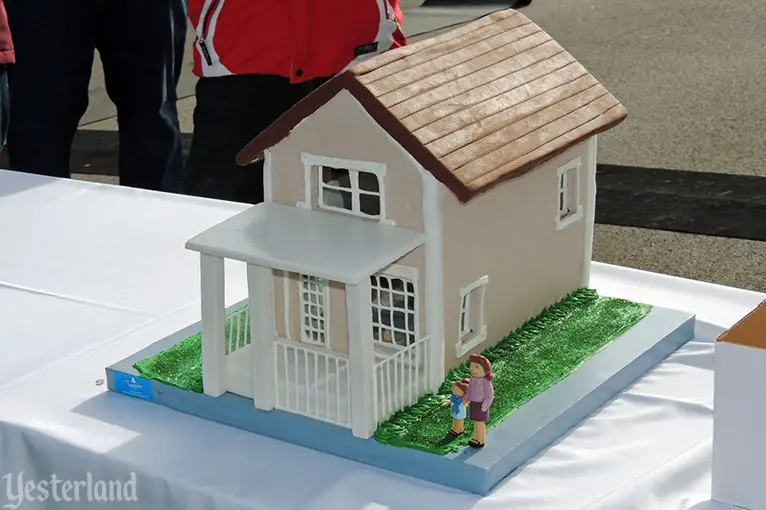
Photo by Werner Weiss, 2013 Birthday cake from TipsyCake |
|||
|
Walt Disney was born 112 years ago yesterday—December 5, 1901—on the second floor of the Disney family home in Chicago. The house is still at the same spot where Walt’s father, Elias Disney, built it almost 121 years ago. You might expect the birthplace of one of the most famous and influential people of the 20th century to be a carefully preserved landmark. It’s not. That’s going to change. Yesterday, on Walt Disney’s birthday, new owners held a press conference in front of the house to reveal their ambitious restoration plans. I was there.
|
|||
|
|
|||
|
Biographies of Walt Disney usually mention that Walter Elias Disney was born on the second floor of a small house on Tripp Avenue in Chicago on December 5, 1901. Some books also mention that his sister Ruth Flora Disney was born there, almost exactly two years later, on December 6, 1903. Childbirth at home was the norm at that time. What about Walt’s well-known brother Roy? The Animated Man by Michael Barrier (University of California Press, 2008) is the only major biography of Walt Disney that also places the birth of Roy Oliver Disney (born June 24, 1893) in the same house. Even Building a Company by Bob Thomas (Disney Editions, 1998), which is a biography about Roy, notes that Walt was born upstairs in the house, but says nothing about Roy’s birthplace. Birthdays are easy to pinpoint. The exact date when a family moved into a new house is one of the those details that can get lost in history. However, evidence suggests the Disney family had moved in before Roy was born. |
|||
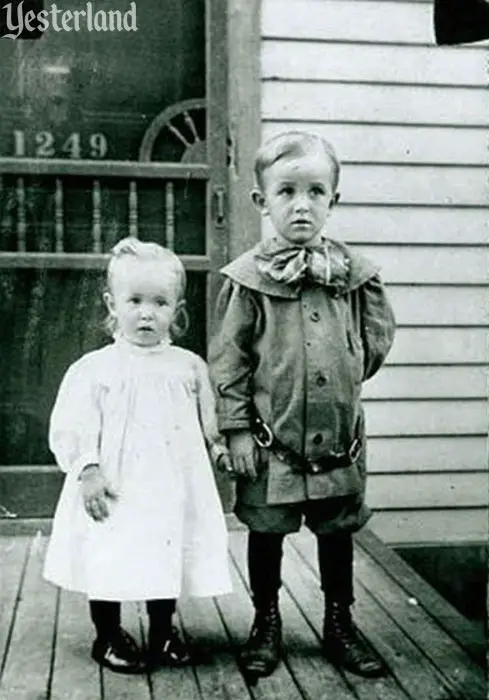
Historical Disney family photograph, 1905 Ruth Disney and her big brother Walt in 1905 |
|||
|
After paying $750 on October 31, 1891, for a 25-foot x 125-foot corner lot in a newly developing area of Chicago, Walt Disney’s father Elias Disney waited over a year before proceeding. A well-researched City of Chicago document (“Walt Disney birthplace, 2156 North Tripp Avenue, Chicago, Illinois: Preliminary staff summary of information” by Timothy Samuelson, prepared 1991, revised 1996) describes what happened next: On November 23, 1892, Elias Disney obtained a building permit to build a two-story, 18 x 28 foot wood cottage, costing approximately $800. Elias was able to keep costs for the cottage low by acting as his own contractor, as well as doing much of the construction work himself. It is doubtful that a professional architect was consulted, but family reminiscences suggest that [Walt’s mother] Flora Disney was instrumental in working out the floor plan and securing construction materials. According to the same document, “The Disney family settled into the house in early 1893.” The document’s author, Tim Samuelson, is skilled at using resources such as annual City Directories to determine who was living where, based on when neighborhoods were canvassed for City Directories. There’s no uncertainty about Walt’s older brothers. Herbert Arthur Disney (born December 8, 1888) and Raymond Arnold Disney (born December 30, 1890) were young children when the family moved into the house in 1893. |
|||
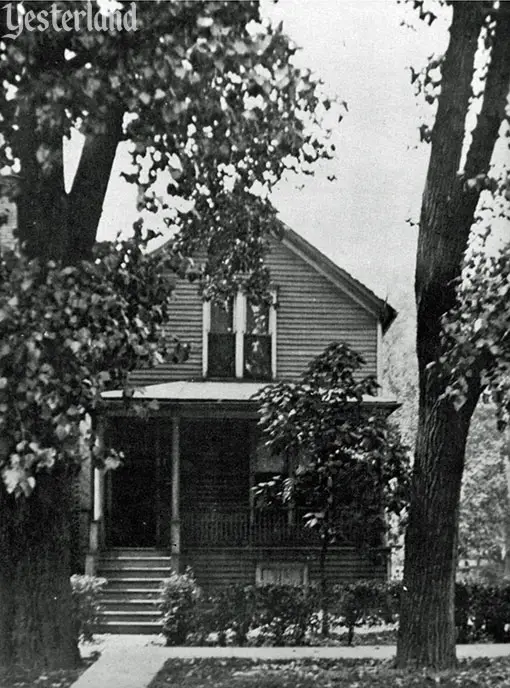
Historical photo, circa 1930 The house as it looked around 25 years after the Disney family moved out |
|||
|
The Disney family moved out in 1906. The house has been enlarged, modified, and updated over the course of more than a century. If the Disney family of 1906 could see it today, they would not recognize the house, although the overall neighborhood might still look familiar. The photo above is the earliest known historical photo of the Disney family house on Tripp. The City of Chicago document referenced earlier identifies the photo as being circa 1930. That makes sense. With the success of Mickey Mouse in 1929, there was finally a reason to take a picture of the house with no people in the picture. By 1930, there had been significant changes—and there would be even more. According to the same Chicago document: Typical of small cottages, the Disney house has undergone several alterations by subsequent owners over the years. Building permits were taken out in 1924 for alterations, but the city records documenting the exact nature of the remodeling have been destroyed. Site conditions indicate the 1924 work involved the raising of the house on a new brick foundation to create a full basement, and a modest addition to the rear. Another early change was the construction of a covered porch across the front elevation, replacing the platform porch originally built by Elias Disney. In the mid-1960s, owners removed the covered porch, moved windows, and enveloped the house in synthetic siding. The 1,000 square feet of the original cottage had grown to around 1,600 square feet. At some point, the interior was reconfigured to convert the single-family house into two apartments, which meant removing the original staircase. |
|||
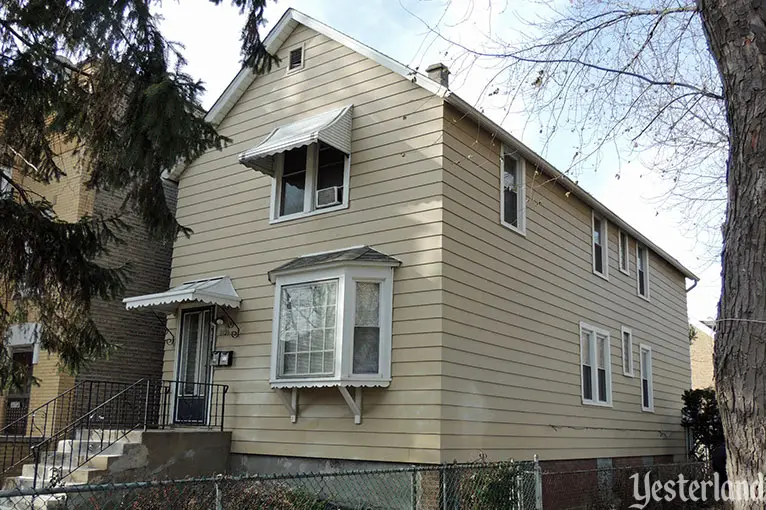
Photo by Werner Weiss, 2013 The Walt Disney Birthplace home in 2013 |
|||
|
In 1997, a push by Chicago’s Department of Planning and Development failed to achieve Historic Landmark status. You can read more about this in this Yesterland article: Walt Disney in Chicago. This brings us to 2013. The southwest corner of Tripp Avenue and Palmer Street in the Hermosa neighborhood of Chicago is the site of an unremarkable two-story duplex apartment house. It’s a simple rectangular box with aluminum siding. The corner lot has grass, flowers, bushes, and mature trees. |
|||
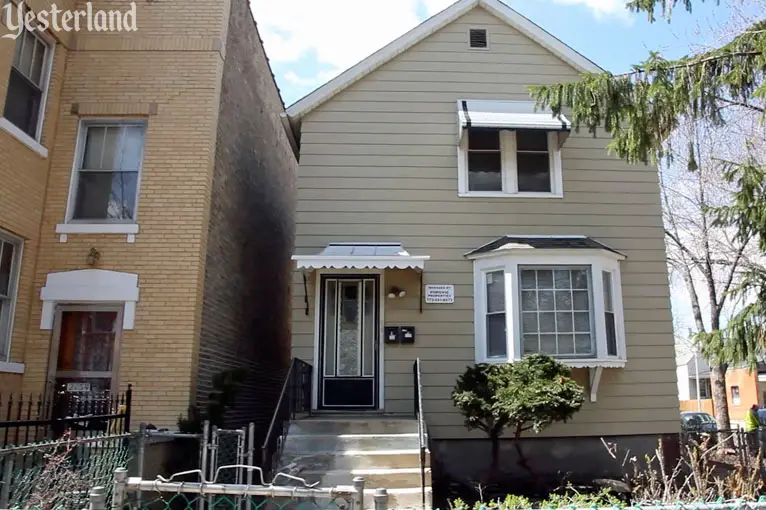
Photo by Brent Young, 2013 Front in 2013, looking quite different than in 1901 |
|||
|
However, what you see now is going to change drastically. On June 28, 2013, a married couple from California, Dina Benadon and Brent Young, paid $173,000 to become the new owners. As much as possible, they will turn the calendar back to 1901. |
|||
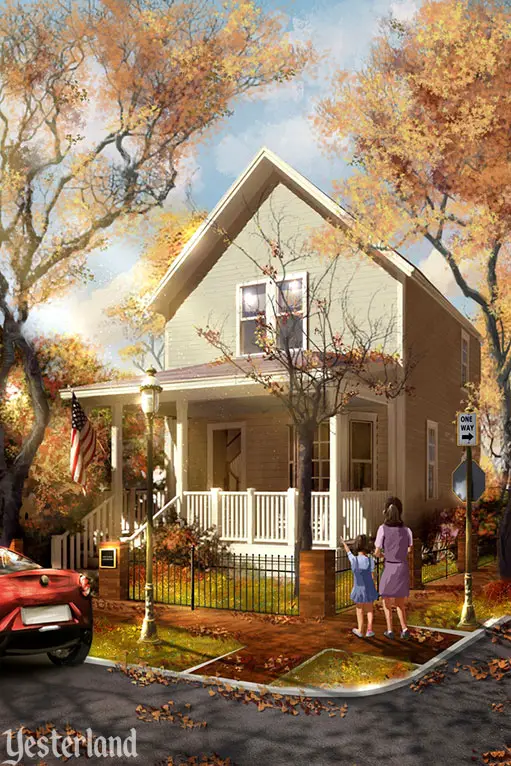
Art by Clara Moon, 2013, courtesy of Brent Young Early concept rendering for the restoration |
|||
|
The rendering above looks great. It’s clearly influenced by the circa 1930 photograph, complete with the covered porch that was probably added in 1924. The rendering shows a commitment to doing a first class job, but it probably doesn’t show what the actual appearance will be after restoration. |
|||
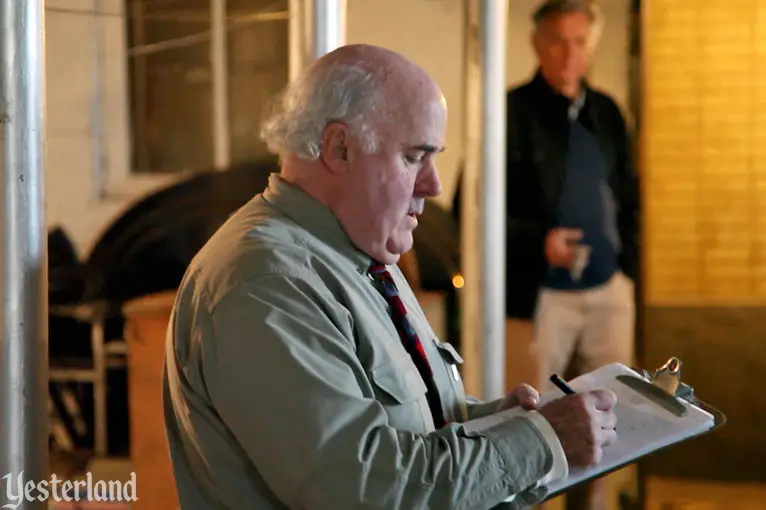
Photo by Brent Young, 2013 Home inspector inside the Walt Disney Birthplace house |
|||
|
Experts will analyze what was there when the Disney family lived in the house. There’s undoubtedly still quite a bit of the original carpentry by Elias hidden under layers of updates and modifications. The building will be reduced back to its original size, configured with its original floor plan, and finished with materials of the period. |
|||
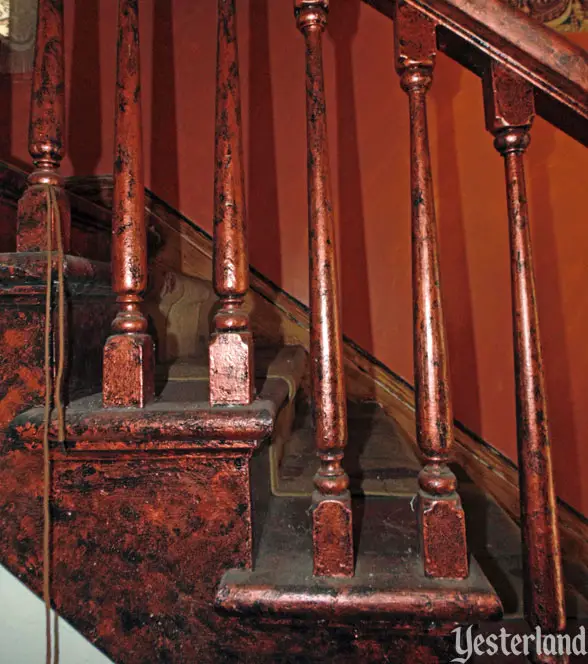
Photo by Dan Ruzic, 2013, courtesy of Brent Young Balustrade in another house built by Elias Disney |
|||
|
One big help will come from the fact that Elias built several other houses in the same area. At least one of them was never converted into a duplex, so it retains original features, including its original staircase. |
|||
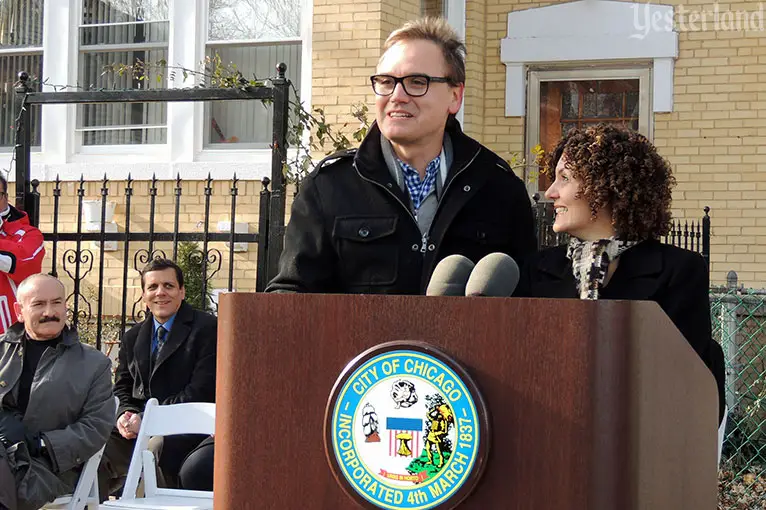
Photo by Werner Weiss, 2013 Brent Young and Dina Benadon, the new owners |
|||
|
This brings us to the festivities of December 5, 2013. The well-organized hour began with remarks by local officials, restoration specialists, and owners Brent Young and Dina Benadon. Young and Benadon are the co-founders of theme park content developer Super 78. Listeners of the excellent Season Pass podcast will know Brent Young as the co-host. |
|||
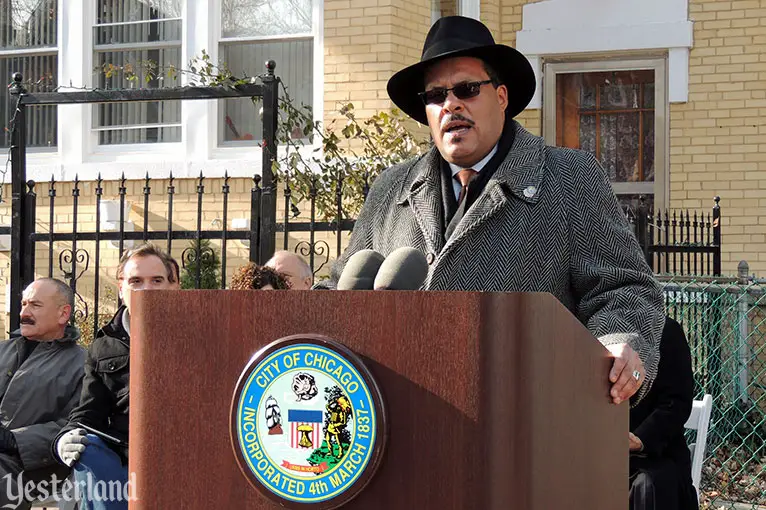
Photo by Werner Weiss, 2013 Rey Colón, 35th Ward Alderman, Chicago |
|||
|
Young and Benadon have done a masterful job bringing in the right people to make the dream a reality. One of the reasons the Historic Landmark effort failed in 1997 was that some prominent Chicago politicians at the time believed untrue allegations about Walt Disney. Now, local leaders such as Alderman Rey Colón, support the restoration and see the genuine benefits it will bring to the local community and the reputation of Chicago. Colón read a proclamation from Chicago Mayor Rahm Emanuel declaring December 5, 2013 as Walt Disney Day in Chicago. |
|||
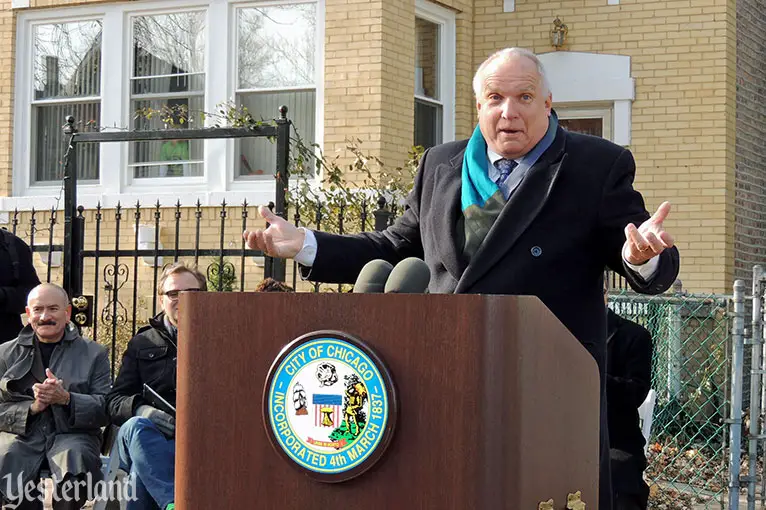
Photo by Werner Weiss, 2013 Tim Samuelson, Cultural Historian for the City of Chicago |
|||
|
In addition to the owners, the Restoration Team includes Chicago Cultural Historian Tim Samuelson (yes, the same guy who wrote the city report in 1991), Preservation Architect Charles Pipal, and Zoning Historic Preservation Consultant Timothy Barton. This is an all-star team. Having seen Charles Pipal’s work elsewhere, having read Samuelson’s report, and discussing the project with both of them today, I am convinced the project will be done right. |
|||
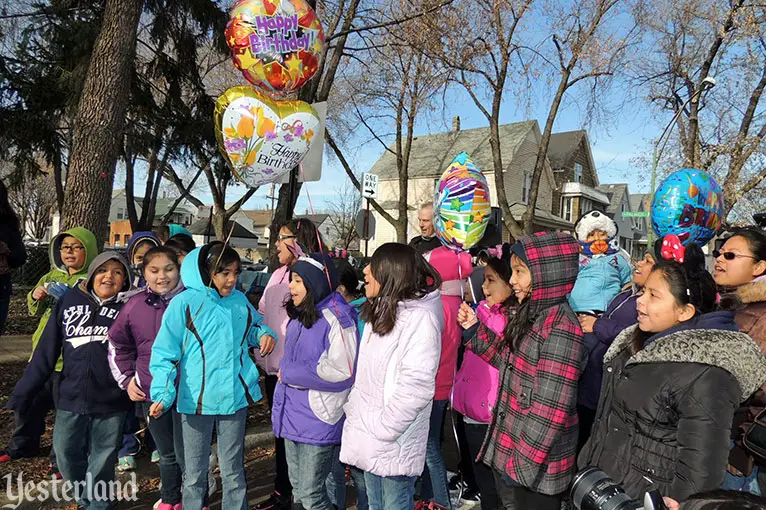
Photo by Werner Weiss, 2013 Fourth-graders from William P. Nixon Elementary School |
|||
|
Fourth-graders from nearby William P. Nixon Elementary School sang “Happy Birthday” to Walt Disney to celebrate the 112th anniversary of his birth. Having the local kids at the event was a great touch, considering how much joy Walt Disney brought to children. It gave the Chicago television news crews some good footage for the evening news. It also demonstrated that the house is in a residential community. The Walt Disney Birthplace can never be a traditional museum with tourists disrupting the neighborhood. Instead, it can be a local asset and a source of pride, with limited guest access. |
|||
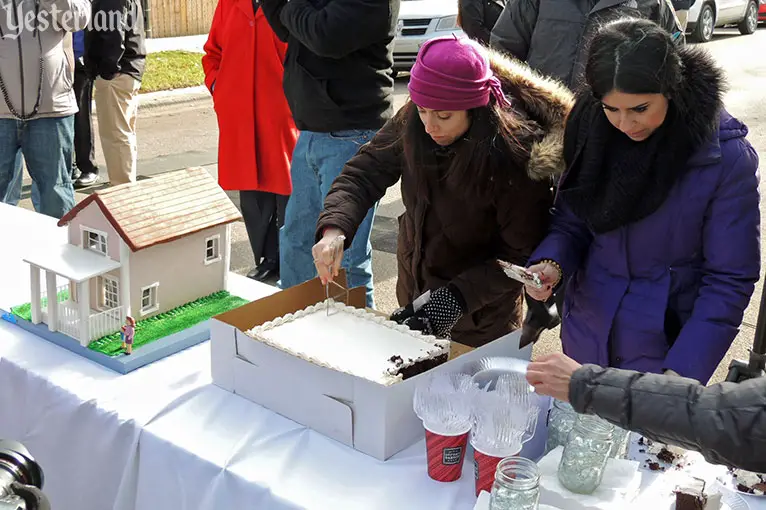
Photo by Werner Weiss, 2013 Birthday cake for everyone! |
|||
|
What’s a birthday celebration without cake? The cake decorated to look like the house was just for show. But there was another cake cut into pieces for anyone who wanted one. Good show. |
|||
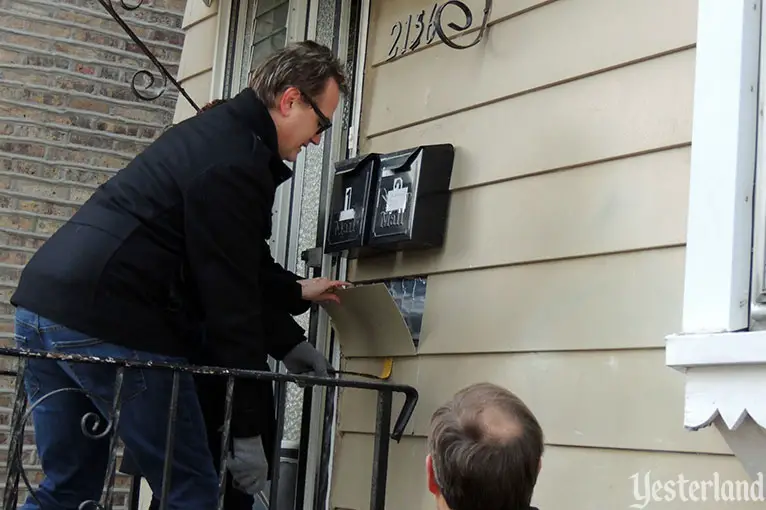
Photo by Werner Weiss, 2013 Prying off a piece of aluminum siding |
|||
|
The event finished with the equivalent of a ceremonial groundbreaking. Instead of digging a shovel into the ground as often happens when new construction is launched, the Restoration Team pried a piece of aluminum siding off the exterior. To everyone’s delight, this revealed what might be the original wooden siding that Elias installed. |
|||
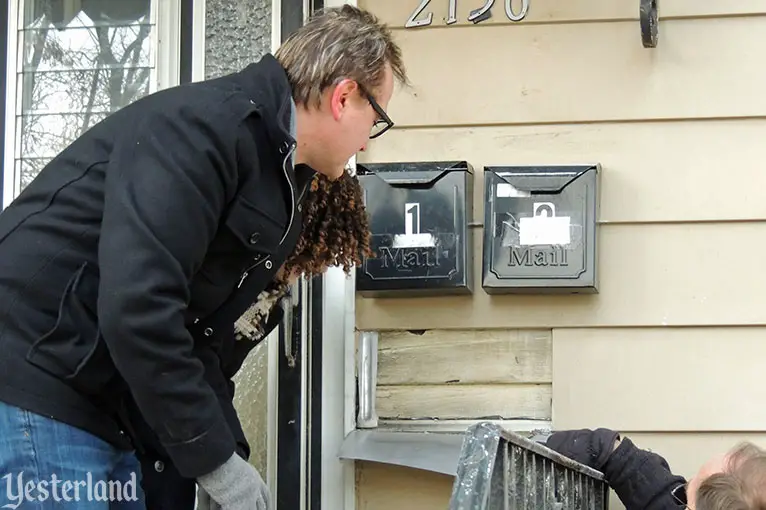
Photo by Werner Weiss, 2013 The original wooden siding underneath! |
|||
|
|
To Support the Project and to Learn More |
||
|
|
|||
|
Kickstarter: The Walt Disney Birthplace Preservation Project Project Website: The Walt Disney Birthplace |
|||
|
|
Click here to post comments at MiceChat about this article.
© 2013 Werner Weiss — Disclaimers, Copyright, and Trademarks Updated December 27, 2013. |
||